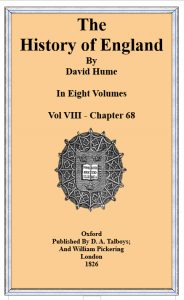CHARLES THE SECOND.
THE king, observing that the whole nation concurred at first in the belief and prosecution of the popish plot, had found it necessary for his own safety to pretend, in all public speeches and transactions, an entire belief and acquiescence in that famous absurdity; and by this artifice he had eluded the violent and irresistible torrent of the people. When a little time and recollection, as well as the execution of the pretended conspirators, had somewhat moderated the general fury, he was now enabled to form a considerable party, devoted to the interests of the crown, and determined to oppose the pretensions of the malcontents.
In every mixed government, such as that of England, the bulk of the nation will always incline to preserve the entire frame of the constitution; but according to the various prejudices, interests, and dispositions of men, some will ever attach themselves with more passion to the regal, others to the popular part of the government. Though the king, after his restoration, had endeavoured to abolish the distinction of parties, and had chosen his ministers from among all denominations; no sooner had he lost his popularity, and exposed himself to general jealousy, than he found it necessary to court the old cavalier party, and to promise them full compensation for that neglect of which they had hitherto complained. The present emergence made it still more necessary for him to apply for their support; and there were many circumstances which determined them, at this time, to fly to the assistance of the crown, and to the protection of the royal family.
A party strongly attached to monarchy; will naturally be jealous of the right of succession, by which alone they believe stability to be preserved in the government; and a barrier fixed against the encroachments of popular assemblies. The project, openly embraced, of excluding the duke, appeared to that party a dangerous innovation: and the design, secretly projected, of advancing Mon. mouth, made them apprehensive, lest the inconveniences of a disputed succession should be propagated to all posterity. While the jealous lovers of liberty maintained, that a king, whose title depended on the parliament, would naturally be more attentive to the interests, at least to the humours of the people; the passionate admirers of monarchy considered all dependence as a degradation of kingly government, and a great step towards the establishment of a commonwealth in England.
But though his union with the political royalists brought great accession of force to the king, he derived no less support from the confederacy which he had at this time the address to form with the church of England. He represented to the ecclesiastics the great number of Presbyterians and other sectaries, who had entered into the popular party; the encouragement and favour which they met with; the loudness of their cries with regard to•popery and arbitrary power. And he made the established clergy and their adherents apprehend, that the old scheme for the abolition of prelacy as well as monarchy was revived{ and that the same miseries and oppressions awaited them, to which, during the civil wars and usurpations, they had so long been exposed.
